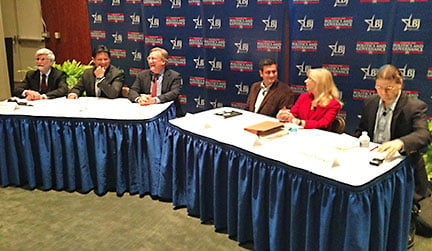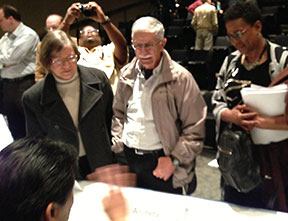Panel discussion focuses on how Golden State experiences inform city’s move to 10-1 council
Updated with video link Tuesday May 7, 2013 10:50am

California’s official nickname, The Golden State, adopted in 1968, harkens back to the discovery of gold in 1848. Now the left-coast state’s experiences with using an independent citizens commission to draw maps for 177 seats in four different governing bodies offers a golden opportunity for learning how best to implement the City of Austin’s 10-1 plan.
The 10-1 plan for electing council members from geographic districts was approved by 60 percent of Austin voters last November 6 who voted for Proposition 3. Work is well underway to establish an Independent Citizens Redistricting Commission (ICRC) that will draw council districts to be implemented in the November 2014 election. The ICRC’s duties are specified in Article II, Section 3 of the Austin City Charter.
Close to a hundred people attended the panel discussion held the evening of Thursday, May 2, at the Bass Lecture Hall on the University of Texas campus. Upwards of half of those raised their hands when asked who had applied to serve on the ICRC.
The event was jointly hosted by UT’s School of Law, the LBJ School’s Center for Politics and Governance, and Austinites for Geographic Representation.

Attorney Steve Bickerstaff has represented more than a hundred jurisdictions on redistricting matters before the U.S. Department of Justice or in state or federal courts. He drafted the initial plan for Austin’s ICRC modeled on California’s process.
Before introducing the five panelists, Bickerstaff noted that voter approval of Proposition 3 last November changes the Austin City Council from seven members elected at-large (meaning every voter gets to cast ballots for every seat on the council) to 10 council members to be elected from geographic districts with only the mayor elected at-large.
“Districts will be drawn independent of the City Council,” he said. “That’s unusual—and the first time in Texas.”
California commissioner

Attorney Angelo Ancheta is director of the Community Law Center and associate clinical professor in the School of Law at Santa Clara University. He was one of 14 people who won a seat on the California Citizens Redistricting Commission. The commission was established as a result of Proposition 11 (the Voters First Act) that voters approved in 2008.
Proposition 11 tasked the commission with drawing boundaries for the California State Senate, California State Assembly, and California State Board of Equalization. Then in 2010, California voters approved Proposition 20, which added congressional districts to the commission’s future responsibilities.
Once the ocean of 30,000 applicants to serve on the California commission was reduced to a pool of 120, those candidates were interviewed for 90 minutes each and screened for conflicts of interest. The final pool of 60 names was submitted to state legislative leaders, who were permitted to strike up to 24 names without stating reasons. “They used all their strikes,” Ancheta said. “If there was a ‘black box’ to the process, that was it.” (Austin’s Proposition 3 process will allow each member of the City Council to, in writing, strike one person each from the pool of 60 without stating why.)
The group of 14 California commissioners met for the first time January 5, 2011, and finished their work and certified the maps on August 15 of that year.
Before the passage of these measures, Ancheta said, California had “an incumbency protection plan for both Democrats and Republicans.” That protection went out the window because the California commission, in drawing districts, was prohibited from considering incumbency, candidacy, or political parties.
“There was a big focus on transparency” throughout the process, Ancheta said, which is far different from how redistricting was accomplished previously by the California legislature.
The commission drew districts in 2011 based on 2010 census data, after holding 34 hearings, at which some 2,700 people testified.
Going through this process, which was designed to take self-interest out of redistricting, was not only fun but was “democracy at work,” Ancheta said.
Grass-roots petitioner

Attorney Fred Lewis was volunteer general counsel for Austinites for Geographic Representation, the grass-roots coalition of 31 organizations that petitioned to get the 10-1 plan on the ballot and campaigned to win voter approval.
Lewis edited Bickerstaff’s original draft for the ICRC to suit the coalition’s preferences.
Before screening a video about how Austinites for Geographic Representation brought about a change in Austin’s at-large electoral system that’s been in effect since 1953, Lewis said, “it’s interesting that it took a political process to create a democratic commission. Otherwise it never would have happened.”
Auditor’s point man

Auditor Jason Hadavi is chief of investigations in the office of City Auditor Ken Mory. Hadavi was the point man for the auditor’s office in doing the front-end work to implement the Proposition 3 City Charter change. He had to build a process for public outreach to maximize the number of applicants to serve on the ICRC and Applicant Review Panel.
Hadavi said when he was put in charge of that work, “I was not prepared at all.” After watching the election-night results roll in, he said he started work the next day. “It was so much more complex than we ever thought.”
Realizing the auditor’s office was ill-equipped to do all of the work on its own, outside counsel was hired. Austinites for Geographic Representation assisted as well.
After meeting with stakeholder groups a public outreach process was conducted that included five information sessions held all over town to educate potential applicants and encourage them to apply. (The Austin Bulldog covered all of these meetings, and reported they were attended by a total of about 90 people.)
The outreach campaign also included bus advertisements, billboards, radio spots, and two postcard mailings to the 40,000 registered voters who met the minimum qualifications. He said a disappointingly large number of postcards came back undeliverable, but in the end, “We got more than we thought we would to apply.”
“We were definitely impressed by the amount of interest,” Hadavi said.
Applicant Review Panel member

Certified Public Accountant Caroline Limaye is one of three members of the Applicant Review Panel of independent auditors. She said the panel hit rough spots when one person drawn to be part of the process was unable to serve, and another had to drop out due to a family emergency. But the process is now on track.
Limaye said, “Awesome is a very good word to describe this process, reading every application and seeing how much talent is out there.
“The painful part is we had over 450 applications and have to reduce that to 60. We’re in the process right now of seeing who will be the top candidates,” she said. “We want to be able to stand behind every one.”
Limaye said the panel members enjoyed, “reading all these applications to see so many good stories that people have to tell, but unfortunately we can only pick 60.”
She said the panel operates in strict compliance with the procedures stated in the voter-approved City Charter change. “All information is on our website.” (To see the status of the application process, click here.) “There is video of our meetings.” (To access the latest video of the May 3 meeting, click here.)
Historical perspective

Attorney Joseph Fishkin is an assistant professor in the University’s School of Law who specializes in constitutional law, employment discrimination, voting rights, and electoral systems.
His presentation added perspective about how reforms in redistricting have come about in this country, to put into context the problems that the Independent Citizens Redistricting Commission (ICRC) is apt to run into.
Fishkin said that some political jurisdictions had not drawn new districts in the first half of the 20th century, creating obvious problems. Although the law required districts to have the same number of voters in each—upholding the principle of one person, one vote—in the 1960s it became apparent that even though districts might have the same number of people, there was no guarantee of minority representation.
“Even after the Voting Rights Act (of 1965) knocked out” obstacles that had prevented minority members from casting votes, such as literacy tests, minorities still did not get elected, he said. This triggered litigation concerning the inequities inherent in an at-large system, in which all positions are filled by numerical places. This is in fact the system that has been in place in Austin from 1953 through the 2012 council elections.
“Cities throughout the South especially were challenged under the Voting Rights Act and the Constitution. This usually resulted in bringing about geographic districts,” Fishkin said.
In fact, there were two legal challenges to Austin’s at-large system in the 1980s. Steve Bickerstaff—the attorney who drafted the initial ICRC plan for Austin—was one of the lawyers who successfully repelled these legal challenges, Fishkin said.
“Throughout the last half of the century,” he said, “courts have generally held that it’s better to move to geographic districts to assure that minorities have a shot at electing candidates of their choice.”
“The chance for minorities to elect candidates of their choice is not the same as electing a person of racial minority,” Fishkin said. “Sometimes minorities choose a member of their same group—and sometimes not.” That may be the result of partisan interests or politicians’ self-interest, he said.
Fishkin said the move to establish the California Citizens Redistricting Commission was precipitated by the unhealthy effects of gerrymandering districts, to the point that all but one of the state’s representatives in the U.S. Congress were protected from a successful reelection challenge. “There was safety for everyone. No one had to face the voters again.”
Although a handful of other municipalities use some form of commission to draw districts, including San Francisco, San Diego, Minneapolis, and St. Paul, he said, Austin will be the first to do so modeled on the California commission.
“If things go well (here), it will likely be adopted by other cities,” Fishkin said.
“Selecting districts by lot is an important and old democratic idea,” Fishkin said, “an idea from ancient Athens, bringing that idea back into a process of electing our representatives.”
Ancheta summed up by saying that Austin has a good process underway. Regarding the desired composition of the ICRC, he added, “You want folks who are good team players. One of the reasons we had a good commission is because we were dedicated and believed in the rule of law.”
“You’re doing districting—not redistricting. It’s a great opportunity to engage the public.”
Questions and answers

Dan Holland, who said he was chair of the Independent Voter Project in California, said he followed the California commission’s work closely and noted there had been a concerted effort to use the redistricting process for partisan gain. He asked Ancheta to talk about how the commission handled that problem.
“That’s the nature of the process. It’s not surprising,” Ancheta said. He said the commission would see red flags when suggested maps were proposed by organizations that could not be found through an Internet search. “You can figure that out fairly quickly. But even if you didn’t figure out there were ulterior motives, you have to be mindful. The vast majority of people who came to meetings just wanted to say something. They were very interested in the process.”
Ron Johnson said the ICRC will have 14 members who probably will have never met each other and are going to be asked to come together and “do something that can only be called revolutionary.” How did the California commission learn to pull together under time pressure?
Ancheta replied, “We had disagreements on a lot of things, but everyone had strong sense of responsibility and wanted to be responsive to the public. That gets you a long way. That drove a lot of the decision-making.”
To watch a video of this panel discussion, click here.
This report was made possible by contributions to The Austin Bulldog, which operates as a 501(c)(3) nonprofit to provide investigative reporting in the public interest. You can help to sustain The Austin Bulldog’s coverage by making a tax-deductible contribution.
Related Bulldog coverage : This is The Austin Bulldog’s 49th article covering issues and activities pertaining to proposed and/or voter-approved changes to the Austin City Charter.
Why Bother: Austin After 10-1: KLRU-TV taping draws more than 200 people for multifaceted discussion of what future holds, April 29 2013
Light Turnout for City Auditor’s Meetings: Five scheduled meetings drew fewer than ninety people, but keen interest shown among attendees, January 29, 2013
City Auditor Kicks Off Info Sessions: Drawing maps for 100 council districts attracts citizens who want to get involved, January 22, 2013
Bumpy Road to Implementing 10-1: Council refuses to pay for child care, mileage. Applications to serve taken Jan. 19 to Feb. 22, January 17, 2013
Massive Interest in Redistricting: City audtor’s forum draws standing-room crowd to brainstorm how to attract applicants, December 4, 2012
Proposed Districting Timeline Draws Flak: Redistricting expert says schedule does not allow enough time for federal approval process, December 4, 2012
Citizens Redistricting Forum December 4: City auditor invites public input for citizens redistricting panel and how best to identify applicant qualifications, November 27, 2012
Prop 3 Proponents to Monitor Implementation: Austinites for Geographic Representation form committee to help guide work on 10-1 system, November 25, 2012
City Hustles to Initiate Prop 3 Tasks: Auditor coordinating with proponents of the 10-1 plan to begin what will be a lengthy transition process, November 15, 2012
10- Plan to Rule Council Elections: Both propositions for geographic representation pass but grassroots group dominates election results, November 7, 2012
Mayor: My Commission Beats Your Commission: Mayor Lee Leffingwell lifts idea for citizens to draw council districts and undercut opposing proposition, November 2, 2012
Prop 3 Fundraising Outpaces Prop 4: Financial support for 10-1 far outstrip dollars donated for 8-2-1 hybrid, September 29, 2012
Prop 3 Proponents Question Prop 4 Legality: Civil rights attorney and two minority groups say federal preclearance for 8-2-1 is unlikely, October 21, 2012
Poll Triggers Backlash from 10-1 Proponents: Proposition 3 advocates saying Prop 4 playing dirty with a misleading poll, Prop 4 denies the charge, October 17, 2012
Proposition 4 Campaign Reports Finances: Late report indicates $2685 raised in last three months but fails to provide details about campaign expenses, October 10, 2012
Proposition 3 Campaign Reports Finances: 10-1 campaign proponents raised more than $40,000, Proposition 4’s 8-2-1 advocates’ report not submitted, October 9, 2012
Proposition 3 Rally Draws 150-200 People: Crowd hears fiery speeches by proponents of the 10-1 system for electing council members, October 8, 2012
Feisty Debate Over Electing Council Members: One panelist argues for no change to the at-large system of City Council elections, October 4, 2012
Proposition 3 and 4 Proponents Rev Their Campaigns: Raising money, organizing troops, and pushing plans for geographic representation on Austin City Council, September 28, 2012
Redistricting Need Not Be a Quintessentially Political Process: Independent redistricting commissions for U.S. states and cities, September 24, 2012
Barrientos Lampoons Prop 4 With a Fable: Other proponents of alternative plans for geographic representation push their points, September 14, 2012
Proposition 3 Advocates Falsely Accuse RECA: Group alleges ‘rumor’ of $100,000 pledge by Real Estate Council to defeat Proposition 3, but RECA says not so, September 12, 2012
No-Change Option Surfaces in Ballot Debate: Former Council Member Bob Binder opposes both options on the ballot for geographic representation, September 11, 2012
The Election Wars Have Begun: Interest in how council members elected running high, as face-off debates abound, September 9, 2012
8-2-1 Near Certain to Go on Ballot: City Council Votes on Second Reading to Put Competition Election Plan on Ballot, July 31, 2012
Hard Fought, Heartfelt Charter Decision: Charter Revision Committee Votes 8-7 to Back 10-1 Plan for Council Elections, February 3, 2012
New Restrictions Proposed for Lobbyist Fundraising: Lobbyists Can Only Give Candidates $25 But Can Collect Unlimited Contributions For Them, January 22, 2012
Committee Debates How to Elect Council: Charter Revision Committee Divided Over Pure Districts vs. Hybrid System, January 9, 2012
Thirteen Charter Changes and Counting: Charter Revision Committee’s Next Job: Tackle Plan for Geographic Representation, December 14, 2011
Council Confirms November 2012 Election Date for Charter Amendments: Resolution Ensures Citizens Initiative Won’t Force May 2012 Charter Election, November 3, 2011
Coalition Launching Petition Drive to Get on the Ballot for May 2012 Election, October 18, 2011
Broad Community Interest Focusing on How Mayor and Council Members Elected, October 4, 2011
Coalition Nearing Petition Launch for Grass-roots Council District Plan, August 24, 2011
Maps Prove Select Few Govern Austin: Forty Years of Election History Expose Extent of Disparity, August 4, 2011
Petition Launch Imminent to Force Election for Geographic Representation in City Elections, March 7, 2011







